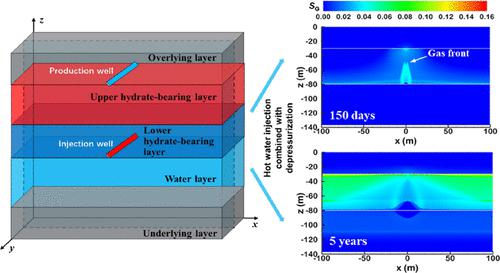当前位置:
X-MOL 学术
›
Energy Fuels
›
论文详情
Our official English website, www.x-mol.net, welcomes your
feedback! (Note: you will need to create a separate account there.)
Numerical Study of the Effect of Thermal Stimulation on Gas Production from Marine Hydrate Reservoirs
Energy & Fuels ( IF 5.2 ) Pub Date : 2022-08-08 , DOI: 10.1021/acs.energyfuels.2c01257 Shilong Shang 1 , Lijuan Gu 1 , Linsen Zhan 1, 2 , Hailong Lu 1
Energy & Fuels ( IF 5.2 ) Pub Date : 2022-08-08 , DOI: 10.1021/acs.energyfuels.2c01257 Shilong Shang 1 , Lijuan Gu 1 , Linsen Zhan 1, 2 , Hailong Lu 1
Affiliation

|
The temperature of hydrate reservoirs will decrease in a gas production process because gas hydrate dissociation is endothermic, leading to a decrease in the gas production rate as sensible heat is exhausted. Heat supply should be an effective way to alleviate the effect of temperature decrease on the production rate, by thermal stimulation, such as hot water injection into a hydrate reservoir. However, the feasibility of thermal stimulation combined with depressurization is controversial. Hence, to investigate the effect of this combined strategy, gas production performance is studied by numerical simulation based on a 2D Cartesian hydrate reservoir model with a two parallel horizontal well configuration. One of the two horizontal wells, at the top of the hydrate-bearing layers, is for gas production, and the other at the bottom of the hydrate-bearing layers is for hot water injection. The influence of the injection rate, temperature of hot water, and permeability of hydrate-bearing layers on gas production is investigated. When only the hot water injection is applied, the released gas, which originates from the dissociation of hydrates around the injection well, tends to be trapped and forms hydrates again. When the production strategy of hot water injection combined with depressurization is engaged, the hydrate dissociation shows a depressurization-dominant feature, and the production is at a relatively high rate, but it seems the hot water injection is still a negative factor in gas production. Because the hot water injection will replenish reservoir pressure and increase the water production rate, the feasibility of depressurization will be compromised. Sensitivity analyses reveal that the increased permeability of hydrate-bearing layers can enhance gas production almost proportionally. It is also found that increasing the temperature of the injected hot water only has a very limited effect on gas production.
中文翻译:

热刺激对海洋水合物储层产气影响的数值研究
由于天然气水合物分解是吸热的,天然气生产过程中水合物储层的温度会降低,随着显热的消耗,天然气产量会下降。供热应该是减轻温度下降对产量影响的有效方法,通过热刺激,例如向水合物储层注入热水。然而,热增产联合降压的可行性存在争议。因此,为了研究这种组合策略的效果,基于具有两个平行水平井配置的二维笛卡尔水合物储层模型,通过数值模拟研究了产气性能。位于水合物层顶部的两口水平井中的一口用于产气,另一个在水合物层的底部用于注入热水。研究了注入速率、热水温度和水合物层渗透率对产气量的影响。当仅注入热水时,源自注水井周围水合物解离的释放气体往往被困住并再次形成水合物。当采用注热水联合降压生产策略时,水合物分解呈现以降压为主的特征,产量较高,但注热水似乎仍是产气的不利因素。因为注入热水会补充储层压力,提高产水量,减压的可行性将受到影响。敏感性分析表明,水合物层的渗透率增加可以几乎成比例地提高天然气产量。还发现提高注入热水的温度对产气的影响非常有限。
更新日期:2022-08-08
中文翻译:

热刺激对海洋水合物储层产气影响的数值研究
由于天然气水合物分解是吸热的,天然气生产过程中水合物储层的温度会降低,随着显热的消耗,天然气产量会下降。供热应该是减轻温度下降对产量影响的有效方法,通过热刺激,例如向水合物储层注入热水。然而,热增产联合降压的可行性存在争议。因此,为了研究这种组合策略的效果,基于具有两个平行水平井配置的二维笛卡尔水合物储层模型,通过数值模拟研究了产气性能。位于水合物层顶部的两口水平井中的一口用于产气,另一个在水合物层的底部用于注入热水。研究了注入速率、热水温度和水合物层渗透率对产气量的影响。当仅注入热水时,源自注水井周围水合物解离的释放气体往往被困住并再次形成水合物。当采用注热水联合降压生产策略时,水合物分解呈现以降压为主的特征,产量较高,但注热水似乎仍是产气的不利因素。因为注入热水会补充储层压力,提高产水量,减压的可行性将受到影响。敏感性分析表明,水合物层的渗透率增加可以几乎成比例地提高天然气产量。还发现提高注入热水的温度对产气的影响非常有限。











































 京公网安备 11010802027423号
京公网安备 11010802027423号